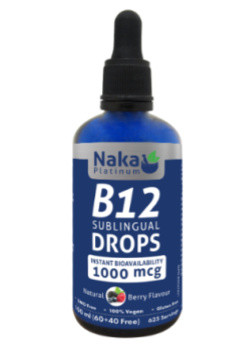VITAMIN B-12
B-12 is required for digestion, fertility and the normal growth and development of all cells. B12 is a water-soluble B vitamin. Deficiencies of B12 may not be seen for several years because the body can store up to 5 years worth of this vitamin. There are several forms of B12 including cyanocobalamin and methylcobalamin. B12 is required in areas where there is high cell turnover, for example the gastrointestinal tract, bone marrow and nervous system. Thus B12 has been used for the treatment of neurological diseases like multiple sclerosis and depression.
Anemia is a lack of the oxygen carrying ability of red blood cells. B12 regulates blood cell production, with folic acid. Lack of B12 leads to types of anemia where the red blood cells look too large, macrocytic, under the microscope. Supplementing sublingually with B12 reverses this type of anemia. B12 is required for digestion, fertility and the normal growth and development of all cells. It enhances learning and memory, and normalizes sleep patterns.
All of the B vitamins work together and are best used by the body in a B complex, which is why many B complex supplements include a small dose of B12 in them. Most B vitamins are water-soluble and any extra from large doses is flushed out of the body easily, therefore it’s best to take lower dosages of the B complex several times a day than one larger dose. Spray or sublingual forms of B vitamins are easily absorbed, as are capsules – if your digestion is healthy, then the tablet form is usually suitable for most people.
If additional supplementation of B12 is needed it can be taken in addition to a B complex. Deficiency of intrinsic factor in the stomach results in the inability of the body to absorb B12. Sublingual formulas are available and are absorbed in the mouth, thereby eliminating the need for intrinsic factor. Methylcobalamin is a form of B12 that is available as a supplement and is easier for the body to use than cyanocobalamin.
B12 is depleted by sedatives, estrogen, oral contraceptives and alcohol. Anti-gout medication, anti-coagulants and potassium supplements block the absorption of B12. Vegetarians that do not consume eggs or dairy products require B12 supplementation. Diets high in protein require more B12 intake.
VITAMIN B12– QUICK FACTS
FOOD SOURCES
Clams, eggs, herring, kidney, liver, mackerel, dairy products, seafood, sea vegetables, nutritional yeast.
DEFICIENCY SYMPTOMS
Anemia, bone loss, fatigue, constipation, depression, dizziness, enlarged liver, eye disorders, memory loss, neurological damage, heart palpitations.
OPTIMUM DOSAGE
1000 mcg daily. May be given as an injection by a health professional. (Clinical doses may be higher as recommended by your practitioner.
WORKS WELL WITH
Vitamin B complex, folic acid, vitamin A, vitamin, C, vitamin E, calcium.
IMPORTANT INFORMATION
The elderly and anyone with impaired digestion are prone to a deficiency of B vitamins, especially B12. There is no toxicity associated with B12


Reviews
There are no reviews yet.